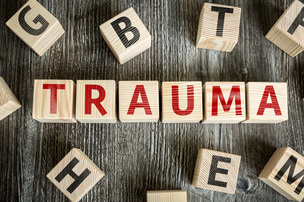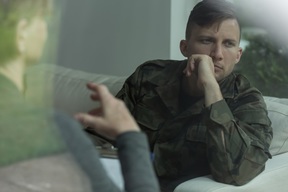 In the movie American Sniper, we see a war vet struggling with post-traumatic stress disorder (PTSD). The flash backs, anger, and hypervigilance are lethal and need intervention. Since this disorder plagues so many (including, but not limited to, military veterans), it is usually the family members who come first seeking help on how to manage and deal with their spouse and/or parent symptoms. PTSD impacts the whole family system. Impairments of this diagnosis are similar to a ripple effect, harming not only the client struggling with PTSD, but causing family members or children to feel the sting as well. Because of my personal experiences dealing with post-traumatic stress disorder, I know more research needs to be generated dealing with the family and social aspects of this diagnosis. The person who suffers with PTSD has sometimes been taught to "pull yourself up by your boot straps and deal with it;" essentially "be tough.” If only it were this easy. As a counselor, I work with my clients to overcome the debilitating effects resulting from trauma. PTSD is a very serious disorder and is now starting to come to light in society today. Spreading the word, researching the disorder, and creating new treatments for these diagnosed individuals is the only way to improve their personal daily life. One of the biggest accomplishments I can make is enabling these individuals to be reintegrated back into a life they are comfortable living.
Remember, PTSD is not only seen in military veterans. Exposure to trauma (including abuse, neglect, sexual assualt, and other types of trauma) can trigger symptoms of PTSD. Some of the negative effects of PTSD may include:
Special care for the children of PTSD victims is also needed. “Children of veterans may also be effected, as evidenced by a RAND Corporation study of over 1,500 children in military families during 2008, which found that these children suffered from more emotional and behavioral difficulties than other American youth,” (Tsai, et al., 2012). Alarming as that statistic is, there may be even more children out there falling victim that have not been reported. When treating people with PTSD, my goal is to aid the person and family in about the disorder. We then process traumatic events using various research-based techniques. Some of these include systematic desensitization, relaxation and mindfulness, clinical hypnotherapy, and developing other coping strategies. If you or someone you know is suffering from PTSD, please seek treatment before it gets worse. Aiding in the trauma treatment, preventing social issues, and protecting family members are vitally important for people suffering from PTSD. Help is out there. The first step is to act. You could save someone! Sarah Mudd is a Provisionally Licensed Professional Counselor at Unlimited Potential Counseling & Education Center in O’Fallon, MO. (MO #2016013189). Sarah is under the clinical supervision of Emily Kircher-Morris, LPC (MO #2012026754). Tsai, J., Harpaz-Rotem, I., Pietrzak, R. H., & Southwick, S. M. (2012). The Role of Coping, Resilience, and Social Support in Mediating the Relation between PTSD and Social Functioning in Veterans Returning from Iraq and Afghanistan. Psychiatry: Interpersonal & Biological Processes, 75(2), 135-149. doi:10.1521/psyc.2012.75.2.135.
1 Comment
12/6/2022 06:22:40 am
It was fascinating to know that symptoms of PTSD can be triggered through exposure to trauma. My friend is starting to take steps to overcome his PTSD. I should advise him to seek guidance from a specialist in PTSD treatment for faster recovery.
Reply
Leave a Reply. |
Archives
August 2021
Categories
All
|

 RSS Feed
RSS Feed